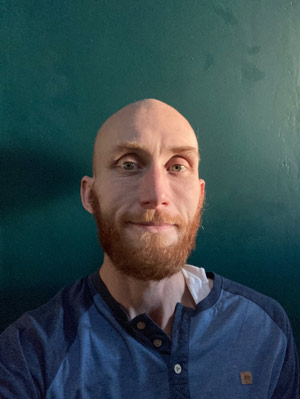When I first stepped into my role as a peer support specialist, there were so many thoughts and emotions racing through my mind. I was plagued with questions like, “Why should anyone listen to me?” and “What if I let someone down?”
The weight of responsibility felt overwhelming, and the fear of failing those I supported paralyzed me.
However, as I continued my journey, I realized that the individuals I was helping were actually helping me. It was their strength and unwavering hope that illuminated my path toward healing.
Finding My Own Help
For the better part of my life, I have struggled with addiction, post-traumatic stress disorder (PTSD), and depression. They kept me spiraling downward and led to some of the darkest moments of my life. One of the people who helped me out of that spiral was a peer support specialist.
I remember thinking how incredible it was that he had been through the same challenges and lived to tell the tale. More than that, he was using his experience to help others.
This is what ultimately led me to take the next step and become a peer support specialist myself. I am only bringing this up because it highlights the impact that mutual support and shared experiences can have on someone’s life.
That said, helping others can come with its own set of challenges.
The Early Challenges
Being a peer specialist is more than just lending an ear or offering encouragement. It’s about understanding, empathy, and sharing personal experiences to help others navigate their own challenges.
Initially, I felt the need to prove myself, to show that I was worthy of the trust placed in me. Every session, every interaction was a test, and the fear of letting someone down was a constant companion. After all, who was I to help others overcome some of the darkest moments of their life?
Here I was, someone who had spent half his life struggling with addiction and mental health challenges, working alongside trained professionals. What could I possibly have to offer?
But as I worked with more individuals, I realized that my vulnerabilities were not weaknesses but strengths. My personal battles with addiction and PTSD were the very things that allowed me to connect with others on a deeper level.
I wasn’t just a peer specialist. I was a fellow traveler on the road to recovery. Helping others has allowed me to recognize that we are not alone on the path toward healing. Similarly, I have realized that together, we will make it farther than we could alone.
A Shift In Perspective
As I continued in my role, I began to see changes in my approach to my recovery. The stories of the individuals I worked with acted almost like a mirror. Each one reflected the steps I needed to take for my own healing.
I started to recognize where I was being hard on myself and setting unrealistic expectations. I saw how I had been neglecting my self-care while prioritizing validation and praise. I have to be honest and say I am not proud of myself for thinking this way.
But it’s the truth. I say this because I now understand how important it is to be vulnerable and to talk about the things that keep us stuck in unhealthy behaviors. In other words, remaining isolated and alone in our thoughts can sometimes leave us in an echo chamber of negativity.
Somehow, I had fallen into the all too familiar trap of thinking that my struggles defined who I was. Even worse, I thought they somehow limited what I had to offer the world.
The Way Out
Working together with these individuals, side by side, helped me recognize the importance of connection. Moreover, it helped me build those connections on our shared experiences. Their successes became my successes, and their setbacks became opportunities for us both to learn and grow.
Once I shifted my perspective outward and away from myself, I started to understand that recovery is not a linear journey. It’s filled with ups and downs, victories and setbacks. More than that, I realized how helping others allowed me to see past my own challenges.
A Dose of Compassion
The biggest impact was on my understanding of compassion. As I focused on helping others, I began to treat myself with the same kindness and understanding. I realized that to truly help others, I first needed to be compassionate toward myself.
Helping others became a path toward healing, a coping strategy, and a source of meaning in my life. Every time I offered support to someone else, I was also supporting myself. The gratitude, the smiles, the moments of growth—they all became a source of strength and motivation.
Through helping others, I have realized that I don’t have to prove myself or be a perfect person. In fact, trying to do so only separates me further from those I am trying to support.
Helping Others as a Path to Healing
While my journey as a peer support specialist is unique to me, the message is universal: helping others can be an incredibly powerful coping strategy and a bridge to connection.
It allows us to step outside of our own challenges and limitations. Moreover, it provides a fresh perspective and reminds us that we are not alone in our struggles.
In helping others, we find purpose, direction, and, most importantly, healing.
To anyone reading this, know that you don’t need to be a peer support specialist to make a difference. Simply reaching out, offering a listening ear, or sharing your own experiences can have an unmistakable impact on someone’s life.
In the process, you might just find that it transforms your life, too.
“A drop of compassion has the power to send ripples of positive change into the world around us.” – Elijah Meason

About the Author: Elijah Meason is a Certified Peer Support Specialist, SMART Recovery facilitator, and a long-time student of meditation. He is also the founder of MHAPSS, an organization dedicated to the professional development of peer support professionals. Currently, he is working towards a Masters’s degree in counseling and lives with his wife in Los Alamos, New Mexico.
Photo by Samantha Garrote: https://www.pexels.com/photo/high-angle-photo-of-woman-on-ladder-2467396/
The opinions and views expressed in any guest blog post do not necessarily reflect those of www.rtor.org or its sponsor, Laurel House, Inc. The author and www.rtor.org have no affiliations with any products or services mentioned in the article or linked to therein. Guest Authors may have affiliations to products mentioned or linked to in their author bios.
Recommended for You
- The Truth about Relapse in Addiction Recovery - April 14, 2025
- The Power of Peer Support in Mental Health Recovery - April 10, 2025
- Artificial Intelligence in Anxiety Management: How AI Helps Users Cope with Anxiety Symptoms - April 3, 2025





